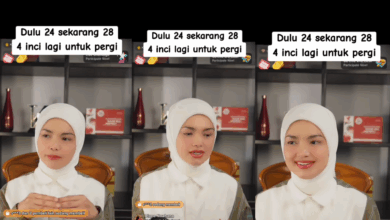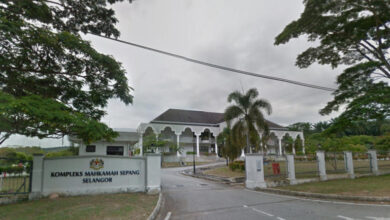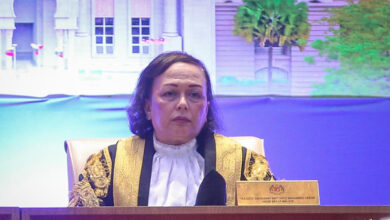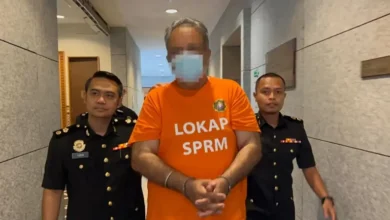The golden age of Umno is on the wane

The golden age of Umno is on the wane. The golden age of Umno is on the wane. Umno is once again deeply split. There is a fracture between the party grassroots, the Supreme Council and the parliamentary caucus. In addition, both the Supreme Council and parliamentary members have divisions and are split on the best way for the party to go in the future.
To complicate things even more, some states are controlled by warlords, who are acting quasi-independently, and engaged with their own rifts and divisions at state-level. Umno from the outside looks like a party about to break apart.
Umno became an institutional icon that was formed in 1946 to fight against the formation of the Malayan Union, on the side of the raja-raja, or royal families, in the interests of defending the feudal Malay structure. Umno later went on to negotiate independence from the British, where the sultans kept their powers.
In this way, Umno has not been a party of the people, but a party with an interest in maintaining the institutional Malay status quo.
Umno’s influence on Malaysian society and politics has been cathartic. Most of the main players of today’s political environment had a beginning within Umno or came from families which supported Umno. Opposition leader Anwar Ibrahim’s PKR was the result of a merging of ex-Umno and supporters of the Reformasi movement, back in 1998, soon after Anwar’s sacking as deputy prime minister and Umno member.
Former prime minister Dr Mahathir Mohamed and current Prime Minister Muhyiddin Yassin are both former Umno politicians. Bersatu has a number of ex-Umno people as members, and at least 13 ex-Umno MPs in its parliamentary ranks. Sabah politics has long been under Sabah Umno’s influence, due to Anwar opening up the Sabah branch in the mid-1990s.
All the contenders for the position of prime minister in the current political crisis are either current or past Umno members. Bersatu ideology resembles Umno’s, and although PKR is considered a multiracial party, the organisational structure and processes within PKR closely resemble that of Umno.
This is not the first time since Merdeka that Umno looks like it could sink into oblivion, breaking up and decaying into small remnants of what it once was.
A divided Umno is very much the party’s history and trademark. Umno’s founding president, Onn Jaafar, left the party over disagreement with the party’s insular race-based political focus in 1951. His successor, Tunku Abdul Rahman, was ousted by the ultra-Malay “Young Turks”, of which Mahathir was a member in 1971, in favour of Razak Hussein, who brought in the New Economic Policy, and heralded the beginning of political corruption within the party.
The party was split again in 1987, with Tengku Razaleigh Hamzah running against Mahathir for party president. Umno became embedded with what was coined Team A and Team B when it became deregistered in 1988 and Tengku Razaleigh left to form a new political party, Semangat 46, fighting a bitter election in 1990.
Umno was split down the middle once again in 1998, when Mahathir, as prime minister, instantaneously stripped his deputy Anwar of all his government and party positions, leading to the formation of PKR.
Umno leadership became strained when Mahathir in retirement took aim at his successor, Abdullah Ahmad Badawi, and then again with his opposition to Najib Razak, who succeeded Abdullah in 2009.
This came to a head when Bersatu joined the Pakatan Harapan (PH) coalition and defeated the Umno-led Barisan Nasional government at the last general election, putting Umno into the wilderness, for the first time since before independence.
Umno’s defeat in the 2018 general election was a surprise to both the party and the opposition.
Mahathir’s relentless personal campaigning against Najib, portraying him as corrupt over the 1MDB scandal, led to a loss of 9% of the Umno primary vote, basically going across to the opposition parties. This took 34 seats away from Umno in Parliament, and lost the BN a number of state governments.
Umno’s share of the national primary vote has been in decline over the last 15 years. However, subsequent by-elections following PH’s win at the general election gave heart to Umno, with BN winning three of them, of which Umno took two out of the three, with substantial majorities.
Ironically, Najib, who appeared at the by-elections to campaign, attracted great attention, with his popular “Bossku” persona that a group of Umno supporters remain loyal to. Najib still has 4.5 million fans on his Facebook page, and 4.2 million followers on his Twitter account, many times more than any other Malaysian politician.
Immediately after Umno’s loss at the 2018 general election, there was talk of reforming the party.
However, the party elections later in 2018, where Khairy Jamaluddin, representing reform, and Tengku Razaleigh, representing a return to a clean conservative Umno, both failed to dislodge Ahmad Zahid Hamidi, who represented the status quo. This indicated that Umno would maintain the centro-Malay narratives, and persona of corruption, as Zahid is facing charges for corruption in court. Any reform in Umno was totally off the agenda. This prevented a united Umno after its defeat, and set up deep division on which way it should head in the future.
Major opportunity missed
Umno lost a major opportunity to regain power during the Muhyiddin-Azmin Ali Sheraton Move. If Zahid had held out on Umno support for the move, there would have been either Zahid or Anwar as prime minister today. It was a risk Zahid did not take, and cost Umno dearly in the long run.
If Zahid had held out, Umno would have been the incumbent government today. If Anwar became the prime minister, Umno could have sat back in opposition with PAS, knowing their combined strength could give them a definite win in the next general election.
Muhyiddin took advantage of a divided Umno and appointed 17 Umno ministers and deputy ministers to his Cabinet, who were not within the party leadership structure. This effectively disconnected a large proportion of Umno MPs from the influence of their party leadership. Muhyiddin dealt a severe fracture into Umno, which has undermined Zahid’s personal authority.
Zahid’s announcement on July 8 that Umno has withdrawn support for Muhyiddin’s government, after Muhyiddin appointed Ismail Sabri Yaakob as the deputy prime minister, and Hishammuddin Hussein as a senior minister, showed Zahid as a paper tiger, totally absent of any leadership authority over the Umno parliamentary caucus.
One would normally write this off and call Zahid a “dead man walking”, but the recent court decision freeing former federal territories minister Tengku Adnan Tengku Mansor from his conviction for corruption, can be seen as a subliminal message to the Umno court cluster that anything is possible.
Umno in a chaotic position
Umno MPs do not know where they can go in the future. The deeply divided Supreme Council now has little control over the parliamentary wing. Thus, Umno is without a strategy, or even a mission, to frame a strategy upon.
PAS’ support for the PN government has put Umno in a corner, where Zahid has publicly dismissed any cooperation with Bersatu, Anwar or DAP. However, most Umno MPs are still supporting Muhyiddin’s government, and even taking up new positions.
This appears to leave Umno fragmented – and in the wilderness. Any hope that the new deputy prime minister will succeed Muhyiddin, should he resign for any health reasons, are totally uncertain. The position of deputy prime minister is largely symbolic, rather than putting him next in line to the prime ministership.
The party grassroots, nominally three million members, have faith that Umno can rise again and win the next election. One group within the party, including Tajuddin Abdul Rahman and Annuar Musa, are trying to save Umno so the party can play a major role within a larger Malay bloc in Parliament. They believe that this way, Umno can become the government once again in a coalition of their choosing, which they can command.
However, some believe this requires the abandonment of the “court cluster”, with the paradox, Najib, actually still very popular within the grassroots of the party, seen as a victim of political persecution by Mahathir.
Muhyiddin is also carrying this card up his sleeve, but playing hardball against the man who dismissed him as deputy prime minister in 2016.
Two narratives are going on within Umno today. One is the Zahid narrative, and the other is the Hishammuddin narrative.
Zahid, popular and influential at party level, is seen as a defender of the Umno cause. Hishammuddin is pursuing a practical narrative of flexibility. He is more influential with the MPs.
This is where being pragmatic is more important than ideology. Zahid’s supposedly secret talks with PKR indicate that the best deal is being sought. Hishammuddin’s past kris-waving antics also indicate that pragmatism can go the other way, too. So, for Umno, all bets are on.
The options for Umno
Umno has three options. The first is to continue supporting Bersatu, which is the easiest option, until the next general election. Then Umno can go all-out in the next election and take as many constituencies back from Bersatu as possible.
The second option is to support Pakatan Harapan, which would be full of all sorts of complexities. Only a small percentage of Umno MPs would favour this option, and the grassroots would be dead against this. This option could unnecessarily split the party permanently.
Thirdly, Umno could go alone in Parliament as an independent party and let Muhyiddin remain as a minority government.
It looks like Umno will fumble through and continue to make contradictory moves and statements.
Umno will go all-out in the next general election and try to win as many constituencies as possible. Umno can no longer dominate Parliament as there are now too many players competing for the hearts and minds of the same Malay electorate.
Umno has no interest in broadening its appeal to other constituencies. So, this restricts Umno to being the kingmaker, and sometimes the king, if it is lucky to have the cards stack in the right direction.
The perception that Umno is a party for opportunists, wealth-seekers, power, and keeping out of jail, will remain in the urban areas. In the rural areas, Umno will remain a tarnished Robin Hood, wearing last season’s outfits. Cash is important to run their election machinery. Consequently, Umno will still pack some punch, but it is not the heavyweight it once was.
Murray Hunter is an FMT reader.
The golden age of Umno is on the wane
Baca Artikel Menarik :
- Polis cari warga asing solat sunat Aidiladha luar surau
- Pemuzik cedera perut ditikam penagih
- Polis kesan keluarga panjat palang besi lari dari kawasan PKPD
- Osman Sapian bidas Puad, Jaga UMNO bukan BersatuBersatu
- Ratusan ‘Solat Raya’ luar surau, Polis mohon maaf terlepas pandang [VIDEO]
- Asia Tenggara medan perang terburuk pandemik COVID-19
Tindakan serta merta! Pesakit bukan Covid dipindahkan ke hospital swasta





You must be logged in to post a comment.